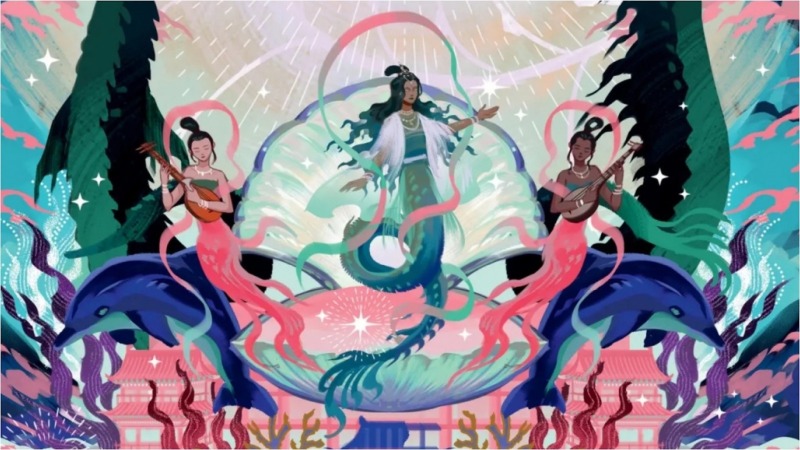Appeasing Radicals, Politicians, and Gods in Eliza Chan’s Tideborn

When readers last left the beautiful and troubled, half-submerged city of Tiankawi, everything had changed. At the end of Eliza Chan’s Fathomfolk, the murder of a god causes the city to nearly collapse—and the sacrifice of the dragon Kai fundamentally changes the humans of the city. To save the humans from drowning, a wish on Kai’s pearl granted humans gills; they now have the ability to breathe underwater. Though it saves their lives, it makes them one step closer to the second-class citizens who have literally sacrificed their magic to power the city: the fathomfolk.
As Tideborn opens Mira, siren, Minister of Fathomfolk, and head of the border guard (as well as Kai’s wife), and former radical activist Nami, a water dragon and Kai’s sister, are trying to put the damaged city back together. Despite Kai’s sacrifice, not everyone is pleased with the changes. The fathomfolk radicals Nami used to think had the right ideas about tearing down the city are promoting not just equality for fathomfolk, but positions of rule over humans. The Cleaven, a group of human radicals, are seeking to surgically remove the gills they never asked for. All Mira has ever wanted is for Tiankawi to be a better place for everyone, especially for the have-nots who grew up poor, like she did. And though Kai’s sacrifice looked like it would be the beginning of a good thing, instead, she’s still dealing with the wealthy and powerful who think they can ignore change, keep the status quo, and not be troubled by the knowledge that the dead god’s mate is out there, likely on the way to destroy Tiankawi.
Nami isn’t sure what her new role should be in Tiankawi, but she finally believes in Mira’s vision, and she wants to see a future where fathomfolk and humans can share the city together. When her mother, the dragon queen of Yonakuni, Jiang-Li, arrives for Kai’s memorial, it becomes clear that her mother doesn’t hold the same vision. Jiang-Li will always want what’s best for Yonakuni, no matter the cost to humans or to Tiankawi, and Nami’s inability to side with her is a disappointment. That fraught relationship only puts Nami more firmly on Mira’s side, so when Mira asks her to undertake a dangerous mission to intercept the mourning god, Nami agrees, putting together a crew she thinks will give her the best chance not only at succeeding in saving the city, but in forming a brighter future. The problem is, not everyone on her crew feels the same way—including her toxic boyfriend and head of the fathomfolk radicals, Frith, who seems determined to undermine any authority Nami might possess.
Cordelia, a sea witch, was instrumental in saving the city from the last disaster, but it cost her access to her two children. Her human husband, a politician whose career she bolstered over their marriage, gave her an ultimatum: stay human and stay trapped, or leave and never see their children again. As he poisons their daughter against all fathomfolk, Cordelia expands a criminal empire, finding herself more prosperous than ever before. She even discovers a way to go legit, help people, and still profit. But what she wants is her daughter back. With help from her son, Gede, the Minister of Defense and the head of the city’s guard, she manages a brief reconnection—but she believes that the sea witch killed her real mother and that Cordelia is lying.
-

-

-

-

-

-

-

-

-

-

-

-

-

-

-

-

-

-

-

-

-

-

-

-

-

-

-

-

-

-

-

-

-

-

-

-

-

-

-

-








































